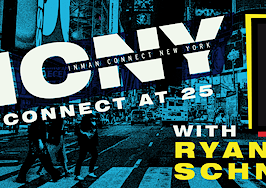Inman events are the best way to connect, learn and grow. Don’t miss the next one, Aug. 3-5 at Inman Connect Las Vegas! Get your ticket now for the best price.
As the real estate market continues its frenzied pace, real estate companies are quickening their race to create the industry’s best end-to-end digital transaction experience for agents and consumers. Although the pieces are still coming together, Keller Williams President Marc King said the goal is eventually to make purchasing a home as easy as ordering a pizza.
“I think last time we were here, we talked about the experience of buying a pizza online was better than buying a home,” he said alongside Douglas Elliman CEO Scott Durkin and Rocket Mortgage EVP Christian Wallace during their appearance on Inman Connect mainstage. “We actually went out and hired the lead engineer from Domino’s to recreate that experience — true story.”
“We actually believe that the transaction is a little clunky and disintermediate,” he added. “So getting all that together, creating a better experience for the client and the consumers is our goal.”
Although the prospect of making homebuying as easy as ordering a pepperoni pizza, King, Durkin and Wallace all acknowledged the transaction process for agents and consumers is much more complicated and varied than making the choice between thin-crust or stuffed-crust pizza. One of the first challenges, Wallace said on the mortgage side, is considering all of the different backend structures that brokerages employ and what it takes to create a platform that could “effectively” work with all of them.
“When you’re looking at your different platforms and different things, we partner with 30,000 agents across the country and they’re all with different brokerages,” she said. “So how do I communicate with all of these different agents that come from indies to large brokerages? It really is one of those things that we have to be able to have that communication with them. They have their systems [and] we have our systems.”
With that in mind, Durkin and King said the ultimate goal in the real estate industry shouldn’t be the creation of one end-to-end platform that will be able to serve each and every agent and consumer. Instead, both leaders said brokerages should liken their move into the digital age to the process of building a car — have a great structure and then pick and choose which parts will yield the performance you want.
“There’s one hood, but when you open that hood, there are 80 different technologies in there,” Durkin said of Elliman’s evolving technology stack. “So I think it’s important to have a great hood, and we have what we call ‘My Douglas’ that has everything inside it.”
“We try it on the agents, or sometimes it’s already proven. We have an entire group of people canvassing what’s out there and we just need to sort of make it more white label for us,” he added of the results of Elliman’s proptech arm Valley Ventures. “It’s been a great thing for us to have the proptech arm, which is out there looking for all of those components to make that hood and what’s under the hood really super.”
King said Keller Williams has been on a similar path for the past several years with the creation of KW Command, Kelle and several other technology tools. King said the Austin-based franchisor has taken a more do-it-yourself to creating the best platform for its agents and affiliates while leaving the door open for third-party integrations.
“Real estate agents — I hope I don’t get in trouble for this — are a bunch of wild ass entrepreneurs, and trying to get us to all do the same thing, the same way, in the same boxes is kind of failing,” he said. “So understanding that having an approach where you can still collect the data, benefit from the predictive analytics and also [having an application programming interface] for all the people who are way smarter than me in the proptech space is a really good idea.”
“Having 200,000 agents and expecting them to do the same thing the same way is not going to work long term,” he added. “So it’s creating a platform that truly does give you all the benefits of the data, [like] being able to predict the next move, for example, and also being able to use whatever platform or [customer relationship management] you want to through your own system. I think that’s the future.”
Alongside determining which approach to technology works best, all three leaders also said there’s the challenge of how agents may react to increased technology costs. However, Wallace said brokerages must remember that people, in general, are willing to pay for high-quality products and experiences that reduce friction, whether its ordering groceries or navigating a transaction.
“I think it’s something that the agents want. I mean, they use their mobile phone and I would think one of the things that COVID has brought out in everybody is we want things to happen quickly,” she said. “There are certain things that I would have never have done two years ago. I use Instacart, I I pay a subscription and I don’t even go to the grocery store anymore. It just delivers, but I’m willing to pay for it.”
“I think people want something fast. I think agents and our customers want the same thing,” she added. “They want that ease to be able to do business. And if whatever that business is, we have to be a game-changer to be able to make a difference in offering those kinds of platforms for them.”
The primary steps to make things faster, Durkin and King said, is streamlining communication to one platform, making the steps of the transaction more transparent, and looping in other vendors, such as lenders, landscapers, repair companies, etc. to create a one-stop-shop for agents to connect consumers with everything and everyone they’ll need to have a smooth experience before, during and after their purchase.
“Transparency is important because most of the time the client is chasing after some updates some information, and to have everyone in the same folder or the same piece of technology, looking at what’s going on in the transaction helps the agent,” Durkin said. “Many times the agent is out in the field showing and the clients thinking they’re not doing anything, or they’re just ignoring them. So I mean, it’s really basic and the whole customer experience.”
King followed, “I think you nailed that, I think it’s about communication. But when you say end to end, which is a term that we all use, right, it kind of denotes a transactional relationship, which is one of the things that we want to get away from. We want this to be an experience, we want this to be a lifelong customer.”
“So I think of it circular, right?” he continued. “It’s the home search process. It’s the buying of the home, first the home, it’s the selling of the home, it’s the managing the home, but that client is always in your ecosystem.”
Although the race for the ultimate end-to-end platform is far from over, all three leaders agreed the most successful brokerages will be the ones who keep the real estate agent at the center of the transaction and make decisions to help agents facilitate a better experience for consumers.
“The agent is the center of the transaction or the fiduciary. This industry doesn’t exist without the agent,” King said. “The challenge over the last decade is a lot of proptech companies have gone straight to the consumer, and what they realized is there’s a really strong personal relationship —it’s meeting face to face that’s required in this industry.”
“It’s still about who likes you, knows you, and trusts you with their, arguably, most highly emotional, highly complex transaction of their lives,” he said. “So what you see now is a lot of proptech companies are shifting and going through the agent partnering. That’s the future of the integrated transaction.”













